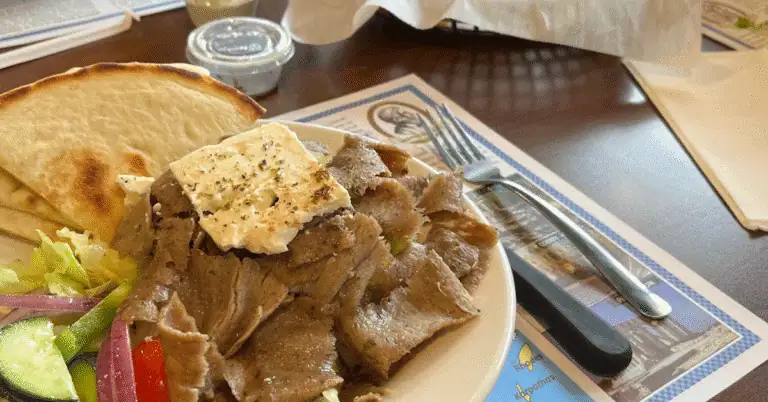The gyro, a beloved Greek staple, has earned its place in Pittsburgh’s diverse culinary landscape as more than just a quick bite; it’s a flavorful, cultural experience. In a city renowned for its eclectic array of ethnic cuisines, the gyro has secured a prominent place thanks to the passion and precision of local restaurateurs and chefs who respect its rich heritage.
A perfect gyro begins with authenticity. Local food experts across Pittsburgh agree that tradition is non-negotiable when it comes to the gyro’s core components. At its heart is meat, often lamb, chicken, or a blend of meats marinated in a carefully balanced mixture of herbs, garlic, olive oil, oregano, and lemon. This meat is then stacked and slow-cooked on a vertical rotisserie, producing tender slices with perfectly crispy edges.
The pita bread is equally crucial. According to several Pittsburgh-based Greek chefs, the ideal pita is soft, slightly chewy, and warmed just enough to wrap around the filling without falling apart. It’s not just a carrier; it’s a flavor and texture enhancer.
Then comes the tzatziki. This cool, tangy sauce, made from thick Greek yogurt, grated cucumber, garlic, dill, and olive oil, is considered by many as the soul of the gyro. Its freshness and consistency balance the rich, savory meat, enhancing the overall experience without overpowering it.
Local food experts also emphasize the importance of balance. A great gyro is not overstuffed but artfully layered with tomatoes, onions, lettuce, and sometimes crumbled feta or fries, depending on regional interpretations. The ingredients should be fresh and vibrant, each bite delivering harmony between acidity, texture, and warmth.
According to veteran chefs in Pittsburgh’s Greek restaurants, one of the most overlooked elements is seasoning. The meat must be bold yet thoughtfully seasoned, with spices that complement rather than mask the natural flavor. This attention to detail is what separates a good gyro from a great one.
Pittsburgh’s growing love for gyros has elevated competition among restaurants, inspiring innovation while preserving tradition for locals seeking the “gyro near me” experience; authenticity and quality still reign supreme.
Quality and Craft: How Ingredients Make the Difference
While authenticity defines the soul of a gyro, quality defines its body. Across interviews with local chefs and food critics, one constant emerges: the gyro’s greatness hinges on the freshness and integrity of its ingredients.
First and foremost is the meat. Lamb remains the traditional choice, known for its distinctively rich flavor, but many Pittsburgh gyro spots offer alternatives such as beef, chicken, or even pork. What matters most, say local chefs, is how the meat is treated before it ever hits the grill. Marination isn’t rushed; it can last up to 24 hours. The spices must penetrate the meat to infuse it with flavor rather than simply coating its surface.
Cooking technique is just as critical. Meat must rotate on a spit long enough to develop those essential caramelized edges while maintaining juicy tenderness within. A poorly cooked gyro, dry, chewy, or under-seasoned, can ruin the dining experience no matter how good the toppings are.
Then there’s the tzatziki sauce. Often overlooked as a condiment, it’s actually a major flavor component. The yogurt must be full-fat and strained to the right consistency. Cucumbers are grated and drained of excess water. Garlic and dill must be fresh, not from powders. According to several Greek chefs in the city, a good tzatziki can’t be rushed it must be made in small batches to maintain texture and integrity.
Freshness also applies to vegetables. A gyro with soggy tomatoes or wilted lettuce becomes a mess of textures and unbalanced flavor. Chefs from local restaurants insist on sourcing their ingredients from local markets whenever possible, noting that fresh produce not only enhances the taste but also improves the presentation.

The pita bread, while simple, must be soft enough to fold yet strong enough to hold everything together. Pittsburgh’s best gyro spots often bake their pita fresh daily or source from specialty Mediterranean bakeries. Some even brush their pita lightly with olive oil before grilling to add flavor and pliability.
Finally, assembly is an art. The gyro isn’t just a sandwich; it’s a layered experience. Each bite should offer equal parts of meat, sauce, and vegetables. Sloppy construction leads to inconsistent bites and poor mouthfeel, according to local culinary teachers and food reviewers.
In Pittsburgh, gyro makers who succeed in balancing all these elements: seasoned meat, fresh vegetables, house-made sauces, and warm pita have earned loyal followings. They treat gyro-making not as fast food but as culinary craftsmanship.
Cultural Roots and Local Flavor in Pittsburgh
Beyond flavor and technique, gyros hold deep cultural value. Originating in Greece and descending from earlier Middle Eastern dishes like shawarma and doner kebab, the gyro has always represented more than sustenance; it is a symbol of community and heritage.
In Pittsburgh, this cultural significance is not lost. The city is home to a large Greek-American population and hosts one of the country’s most vibrant Greek food festivals. Here, gyros are not only restaurant staples but also street food favorites during community events, parades, and family gatherings.
Food experts and local Greek families share their emotional connection to the gyro. It’s a dish that reminds them of home, of tradition, of late-night meals with family and neighbors. The spices, the aroma, and the shared experience all evoke strong nostalgia and pride.
Restaurants that recognize and honor these cultural ties often stand out. They don’t just sell food; they offer stories. They keep ancestral recipes alive, training their staff to understand not just how a gyro is made but why it matters.
Several of Pittsburgh’s top Greek eateries source recipes that have been passed down through generations. These aren’t generic “Greek-style” gyros. They’re handcrafted meals made with cultural pride. For the customer, the experience goes beyond eating; it becomes an entry into the story of Greece through flavors, techniques, and memories.
Some chefs in Pittsburgh have even adapted their gyros to reflect local influences, such as using locally raised meats or adding regional produce in limited-time specials. These variations respect the original while paying homage to Pittsburgh’s evolving palate.
Local food writers often point out that the best gyros in the city are served not just with tzatziki but with a generous side of conversation. The family-owned nature of many gyro shops contributes to a sense of community that chains simply can’t replicate. Patrons are greeted by name, stories are exchanged, and traditions are upheld.
This cultural richness adds depth to the gyro’s appeal in Pittsburgh. It’s not just about finding a quick lunch; it’s about participating in something deeper, something with roots.
The Final Touches That Define Perfection
Even when all the flavors are in place, presentation and service make or break the dining experience. Local food experts consistently say that the perfect gyro is one that’s made with care, presented with pride, and served with knowledge.
Presentation is important. A gyro should be wrapped neatly, allowing the customer to enjoy it without it falling apart. The ingredients should be visible but contained within the product. A fresh sheet of parchment or foil wrap not only serves a practical purpose but communicates cleanliness and attention to detail.
Chefs in Pittsburgh’s most respected gyro shops often say they treat plating and wrapping with the same seriousness as the seasoning. Even when serving takeout, they ensure the gyro maintains its structure, flavor, and heat.
Service matters just as much. Patrons remember not only how the food tasted but how they were treated. Pittsburgh diners have voiced that their favorite gyro spots are those where staff know their names, remember their usual orders, and are passionate about the food they serve.
Transparency also builds trust. Many gyro restaurants now openly share how their food is made, offering behind-the-scenes peeks on social media or even letting guests watch the spit in motion. This openness helps customers appreciate the process, enhancing the perceived and actual value of the meal.
The final touch that defines perfection is consistency. Customers want to know that each time they visit, the gyro will be just as flavorful and satisfying as it was on their last visit. Consistency builds loyalty, and loyalty builds reputation.
Pittsburgh is home to several establishments that hit this mark. They’ve built their businesses on a combination of traditional techniques, ingredient integrity, customer care, and respect for the gyro’s cultural heritage. The result is clear: loyal customers, strong reviews, and a place of honor in the city’s food culture.
Gali’s Gyro and Grill: A Local Standard for Authentic Greek Flavor
At the heart of Pittsburgh’s thriving Mediterranean food scene stands Gali’s Gyro and Grill, a family-owned Greek restaurant that has mastered the art of the gyro. Founded in 1999 by Greek natives Dimitri and Ellie, Gali’s has become a beloved destination for authentic Greek cuisine and unmatched hospitality. Their signature gyro is a testament to tradition and quality, made with perfectly seasoned meat that is slow-roasted on a vertical rotisserie, paired with warm, fluffy pita, fresh toppings, and house-made tzatziki, crafted daily. The restaurant emphasizes old-world flavors with a modern touch, honoring Greek culinary roots while serving the Pleasant Hills community with passion and consistency. Whether you’re dining in or taking your meal to go, Gali’s delivers the authentic gyro experience Pittsburgh locals have come to cherish.




